

URUMQI, Sept. 24-- Muslims in the Xinjiang Uygur Autonomous Region began celebrating on Thursday as one of the biggest religious festivals in China gets underway.
The three-day Corban Festival, also known as Eid al-Adha or feast of the sacrifice, centers around a large feast as Muslims slaughter lambs to share with the whole family.
"The Corban Festival is one of the most important festivals for Muslims," said Ekeram, a 31-year-old Uygur civil servant living in Kashgar." Just like the Spring Festival for the Han people."
Xinjiang has a population of more than 21 million, with more than half of Muslims from 10 ethnic groups, such as Uygur, Kirgiz, Kazak and Uzbek.
PUBLIC HOLIDAY
This year's Festival has been eagerly anticipated by Uygurs and other ethnic groups as it lines up with Mid-Autumn Day, a traditional Chinese festival for family reunion.
In an effort to allow longer celebrations of both holidays, the provincial government declared a five-day national holiday for all nationalities in the region.
People used to begin preparing for the festival two weeks in advance, cleaning their houses, preparing ethnic foods, and purchasing new clothes for the celebration. Those living away from family rush home to celebrate.
Ekeram said he used to buy a lamb days before the festival and slaughter it the first morning of the Corban Festival, boiling it and feasting with his family.
Its a time when Uygurs make rounds visiting parents and other elders in the family after the morning prayers.
"Every one is warmly welcomed and cordially treated during the festival," Ekeram said.
CELEBRATE WITH A HAN FRIEND
Nurbiyam, 39, a Uygur woman in Kashgar, said all the men in her family will go to attend the morning prayer service in the Id Kah Mosque, which is the largest mosque in the region.
The mosque attracted about 100,000 muslims from across Xinjiang during the festival last year.
Nurbiyam and her husband have seen a rush of business at their traditional Uygur clothing store as the festival approached, she said.
Their partner Zhou Weiqing, a Han man who helps produce the clothes in south China's Guangzhou Province, sent 3,000 yuan (470 U.S. dollars) as a gift for her children during this year's festival.
"I have invited him to come to Kashgar and celebrate the Corban Festival with us," Nurbiyam said.
TOURIST PARTICIPATION
At Chen Liang's youth hostel, the beds are overflowing with travellers for the festival and tourists visiting old town.
"The hostel has become increasingly crowded and some people have even had to camp in the yard," he said.
In the festive spirit, Chen said he'll buy a lamb to boil and share with guests.
"Last year, 55 people staying in the hostel shared a lamb during the Corban Festival," he said.
Jan Hofen, 27, is among those celebrating the festival in Kashgar's old town.
"I heard about terror attacks in the area, but I still chose to come. I find Kashgar safe and my friends to visit," he said.
Muslims From Other Ethnic Minorities
Besides Uygurs, other ethnic minorities such as Hui, Kazakh, Uzbek, Tajik and Kirgiz also celebrate the Corban Festival.
Ma Xueyan, a Hui minority, was purchasing goods for the festival in a Muslim supermarket in Urumqi, capital of Xinjiang Uygur Autonomous Region.
"Nuts, cakes, jam, and tea are necessities for the festival," Ma said.
Sulayman, 35, from the Kirgiz ethnic group, said in his hometown in Kirgiz Autonomous Prefecture of Kizilsu, people participate in games like horse racing, lamb grabbing and sing folk songs to celebrate the festival.
Though Sulayman has got used to the city life, he still keeps the tradition of slaughtering a lamb on the first day of the festival.
"We cannot slaughter lambs in our modern residential community but there are some live-stock markets in Urumqi offering a place for us to do it," Sulayman said.
"You can find that people drive flocks of lambs to sell on the street or in some residential areas, which you can rarely see in other big cities in the country," he said.
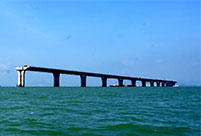 Construction of HK-Zhuhai-Macao Bridge enters final stage
Construction of HK-Zhuhai-Macao Bridge enters final stage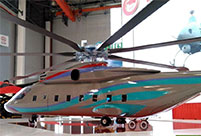 Model of heavy-lift copter makes debuts at Tianjin expo
Model of heavy-lift copter makes debuts at Tianjin expo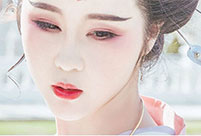 Art photos of Chinese beauty in Han Chinese clothing
Art photos of Chinese beauty in Han Chinese clothing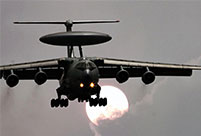 Stunning photos of air show in China’s V-Day parade
Stunning photos of air show in China’s V-Day parade Models change clothes on street in Hangzhou
Models change clothes on street in Hangzhou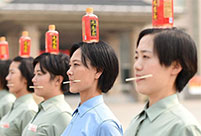 Charming Chinese female soldiers
Charming Chinese female soldiers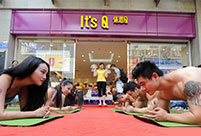 Beauty vs. muscular man
Beauty vs. muscular man World's passenger plane giants convene in Beijing aviation expo
World's passenger plane giants convene in Beijing aviation expo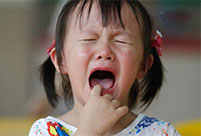 First day in kindergarten
First day in kindergarten Cheating Canada
Cheating Canada Fall of the front
Fall of the front NDRC defends credibility of GDP data
NDRC defends credibility of GDP data Xi-Obama meet can set template for future
Xi-Obama meet can set template for futureDay|Week